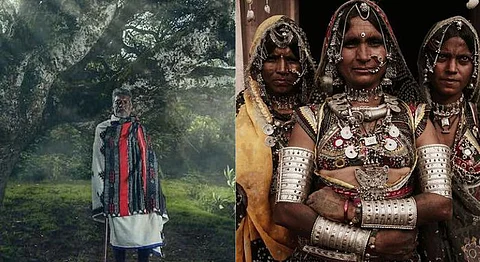
- HOMEGROWN WORLD
- #HGCREATORS
- #HGEXPLORE
- #HGVOICES
- #HGSHOP
- CAREERS
- ABOUT US
- CONTACT US

Fashion, like most forms of art, is intrinsically tied to the idea of identity and culture. Over the last few years, there has been a need to redefine what ‘Indian-ness’ means when it comes to fashion, our sense of clothing, and what we wish to represent to the world. While many looked at the west to fuse modern notions with traditional Indian handicrafts there are others that chose to look deeper within the Indian hinterlands.
They decided to explore the many indigenous groups of India that lend it its own unique identity and incorporated them into their designs, both to revive the lost art and to bring it to the forefront as well as to make more people aware of the immaculate handicrafts and artworks that blend seamlessly within the sustainability narrative. With over 700 indigenous tribes in India, their sustainable practices, zero cruelty fabrics and no wastage techniques make them extremely relevant in today’s social context. Here are some Homegrown brands that are redefining fashion and bringing indigenous people’s art to the forefront.
Delhi-based designer Ragini Ahuja’s brand Ikai claims to stand for empowerment, fierce femininity and self-expression, it is these values that she wishes to translate into wearable art since she started her brand in 2012. Her designs take inspiration from traditional handicrafts and are known for their tribal inspiration combined with unconventional designs. It is her collection inspired by the Drokpas Of Himalayas (a small clan that claims to be of Aryan descent and inhabits small nestles of villages in Ladakh) during the London Fashion Week in 2017 that brought her designs to the forefront. The designs drew inspiration from the sheepskin and floral garments adorned by the members of the Drokpa clan that blends seamlessly with Ahuja’s philosophy of anti-fit clothing. Their cloth is sourced locally from India and crafted by local artisans. On their website, Ikai claims that they derive inspiration from wandering nomads and tribes from remote parts of the world and try to incorporate those motifs in their designs. Their collection ‘Shibori’ derives inspiration from Japanese traditional techniques and the Clan collection uses intricate tribal pattern applique.
You can check out their brand and collections, here.
At the heart of Pune-based label, Ka-Sha by Karishma Shahani Khan, is the vision to celebrate craft in all its glory while being mindful of both the environment and the people involved in the process of producing the clothes. The brand derives its inspiration from various traditional, artisanal and indigenous techniques and appliques. Among this is one of their collections that is inspired from the Rabaris of Kutch, a community that considers their way of clothing as a way to self-expression with various colours, jewellery and embellishments being an indicator of the person. Their focus on conscious clothing has lead to ‘Heart To Haat,’ an extension of their brand that is “inspired by the indigenous ideology of reusing, repurposing & reclaiming. It focuses solely on post-production remnants and using innovative techniques to give them a new life alongside providing essential services such as mending & repairing pre-loved clothing,” as the brand mentions on their website.
You can have a look at their collection, here.
For Kochi-based slow fashion brand Linen Trail, the celebration of the embroidery and craft of the Toda Tribe of Nilgiris must come at the cost of sustaining their livelihoods as well. The brand draws inspiration from the Pukhoor (a Toda Classic striped shawl) which has intricate embroidery in red, black and white colours with the addition of deep blue colour in recent times. The embroidery is rooted in motifs from their culture as they pray to sun, moon and trees and is symmetrical and geometric. Talking about the brand’s Toda Collection, Shalini AnilKumar the head designer of Linen Trail told The Hindu, “I wanted to create a timeless, seasonless collection that could be worn any time, anywhere...[Vasamilli] (one of the Toda women working) was categorical that she wanted their embroidery to remain original and without any changes. So we remained true to it. But I also wanted a long-term partnership with them and asked the women if they would embroider other patterns.” The brand aims to sustain the lifestyle and art of the Toda tribe while drawing inspiration from their gender-fluid fashion style.
Check out their collection here.
Darjeeling-born Priyanka Ella Lorena Lama’s fashion label is a zero-waste sustainable and slow fashion brand that usually creates designs from a single piece of cloth to create silhouettes and minimise the environmental impact. An artisanal concept label all their garments are hand-stitched and they don’t use machines at all. Many of their designs are inspired by the Indian pastoralists and indigenous tribes among which is the collection they showcased at the Somerset House, London back in 2017. The collection was inspired by the Lachenpas and Lachungpas of Sikkim and showcased ‘Bakhu’ (a traditional cloak style garment) by using handwoven ‘Eri’, also known as ‘Ahimsa silk’ (non-violent or peace silk it is made from the discarded cocoons when the silkworm transforms and leaves it behind).
You can know more about the brand here.
If you enjoyed reading this, we suggest you also read:
